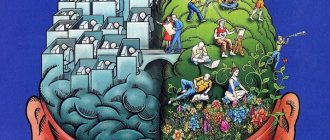Wisdom. Much has been written and said about her. Less, of course, than about love - more has been sung and said about it. However, we have no clear idea of either one or the other. What is wisdom?
You can read thousands of books, you can get three higher educations, you can even start teaching yourself, but still not gain wisdom. Is wisdom a manifestation of a high level of intelligence? Or is this unrelated? There is such a thing as an “effective manager”. Simply put, this is someone who has learned to sell effectively. And if it’s even simpler, it’s effectively “selling” people something that most often they don’t need.
Such a person will most likely be able to tell you a lot about how to make a career, how to influence people, how to earn a lot of money, how to “become successful” and so on. But if you look at the life of such a person, you can understand that he is deeply unhappy. Most often, he doesn’t even have time to realize this, because his whole life is work and, in between, attempts to “relax” using strange ways to do it.
What is wisdom
Wisdom is the main human quality that makes it possible to make the right decisions.
Only wise decisions can bring the greatest benefit to humanity. By accumulating knowledge and effectively applying it in practice, we become wiser and take the path of truth. In simple words, wisdom is deep knowledge, a person’s ability to qualitatively assess any situation based on life experience. Having some knowledge is not enough to gain wisdom; you need to learn how to apply this knowledge correctly.
In philosophy, it is believed that wisdom is a certain level of human knowledge of the world that comes with experience. In Greek, the word Sophia (Sophia) is translated as wisdom. This is where the name of the science of philosophy comes from.
Religion says that only the Lord God has real and complete wisdom, and people get only a small part of this priceless quality.
Wisdom and life
As for the everyday understanding of wisdom, there is also a clear connection between mental and intellectual abilities along with the acquisition of experience throughout life. This is the so-called worldly wisdom, it accumulates in people in the process of growing up and it is formed with the advent of different situations that we encounter.
Wisdom is a human gift that is intended for performing good deeds. Having certain skills, each person, applying them in practice, must be aware of his responsibility to other people. After all, all our actions can influence the fate of other people.
All this helped our ancestors discover new natural laws and develop the progress of mankind. People studied weather phenomena, built hypotheses and drew conclusions from this, thus developing an understanding of all the laws of physics and nature known to us. The accumulated experience is passed on from generation to generation and thanks to this, humanity has created civilization.
Does everyone need to become wise?
Wisdom leads to a certain way of life, during which a person refuses to satisfy his sensual desires. Until a person extinguishes the flame of desires within himself, he will not be able to become sages.
The sages say that the flame of desires can be extinguished either by completely stopping adding oil to it, or by pouring oil on the fire so that the fire goes out. Oil is pleasure, and fire is our desires. While this fire burns inside the heart, it will be almost impossible to live in accordance with wisdom, since there will be neither self-control nor peace.
To get rid of desires means to stop receiving pleasure and to contemplate the object of desires. While at home, you may not eat very much, since at home you eat mostly simple food, which is useful and necessary for the body, but does not satisfy the senses at all. However, when you go out for a walk in a crowded place, your eyes come across large posters with juicy, bright and unhealthy food. This is how desire arises, which personifies the fire in the heart. Being not extinguished, he starts a fire, but being satisfied, he calms down only for a while, after which he again demands reinforcements. To get rid of desires means to stop thinking, striving and contemplating the object of desires. This requires discipline and self-control. But any desire associated with feelings can fade over time.
Pouring oil on a fire means immersing yourself in the fulfillment of your desires, realizing that satisfaction of feelings cannot bring happiness. Having tasted an attractive-looking cake, but felt the disgusting taste, you immediately lose the desire to eat it again. For this reason, a person who is unable to get rid of his desires either through knowledge or through discipline and volitional efforts should understand in practice the impossibility of satisfying the senses and obtaining happiness from them. Desires bring only suffering to a person, forcing him either to be unsatisfied or to work incredibly hard in order to achieve an ephemeral goal, which will again and again move away from the person, like a carrot in front of a donkey’s nose, tirelessly dragging the cart forward. This is Sisyphus's work .
Thus, a person who is unable or unwilling to stop his desires and sacrifice them to the spiritual path cannot gain wisdom, since it contradicts the path that is most important to him. Instead, he should act according to his nature, take his responsibilities responsibly and fulfill his duty. When feelings calm down over time, wisdom will reveal itself to an honest, diligent person, giving him the opportunity to begin to comprehend wisdom.
Not everyone needs wisdom, because, in fact, not everyone wants to comprehend it. It is impossible to achieve it without sacrifices. And since it is necessary to sacrifice desires, attachments, views, ideas and worldviews, this path will only bifurcate and stagnate a person. In this case, he should simply honestly fulfill his duties and bring benefit to others through his actions, gradually abandoning both bad habits and bad behavior.
So, wisdom is a quality that comes from experience, knowledge, other qualities and understanding . Wisdom opens up the opportunity for a person to live happily, finding satisfaction and happiness in himself. Comprehension of wisdom is the process of comprehending knowledge, cultivating positive, good qualities and getting rid of low, vicious ones, as well as gaining and correctly understanding the experience gained in the course of life. However, not everyone really needs wisdom, since it requires great sacrifice.
The willingness to make such sacrifices indicates a readiness to embark on the path of attaining wisdom. Good luck.
Who has wisdom
Wisdom is a tool that allows any person to take correct and rational actions. In this way, we can better understand and realize the world in which we live, and also understand ourselves more deeply.
As a rule, wisdom is a product of the maturity of the human mind, but it is worth understanding that each person has his own unique individuality, which in different situations makes it possible to be at different levels of wisdom development at a certain age. Simply put, there are people who, at 35 years old, have the wisdom of an old man, just as adults have the understanding of a child.
The author's attitude to the problem
Wisdom is often understood as rich life experience, but experience can be different and is not always distinguished by wise decisions and actions. A wise person has a number of certain qualities: he must be serious, be able to approach any matter thoroughly, analyze what is happening and admit his mistakes. A truly wise person will never consider his opinion to be the only correct one. If he is faced with a problem, he listens to the judgments of others, and then makes a decision after weighing the pros and cons. But just the desire to become wise is not enough; you need to learn wisdom throughout your life. Life itself is a school of wisdom.
Proverbs about wisdom
The power of wisdom has been talked about everywhere and always. In all countries of the world there are a huge number of proverbs, aphorisms, songs and films dedicated to wisdom. This is not surprising, because every person with higher knowledge wants to preserve and pass on the accumulated life experience to other generations. Creativity always remains the main source of information, which is the heritage of every nation and all humanity.
Wisdom accumulates throughout our lives. To become wiser, you need to work hard on yourself and learn to admit your own mistakes. As a rule, wise people make this or that decision with restraint and balance, relying on their own experience and the knowledge of our ancestors
It is impossible to convey the true meaning of wisdom, however, every proverb or saying contains the most important components of concepts that allow us to better understand what wisdom is. For example, this proverb: “every day of life adds a piece of wisdom.” This saying gives some value to wisdom for the human worldview. As we live every day, we learn something new and the accumulated knowledge makes us more intelligent and understanding.
Today, a large number of proverbs about wisdom have been collected, as we have already found out, it is very important to pass on the knowledge of the wisest people to other generations. The following are a few proverbs about wisdom:
- Happiness suits the sage;
- He is wise who knows himself;
- Wisdom is in the head, not in the beard;
- The whole earth is open to a wise man;
- A wise man sees the truth, but a fool learns it on his back.
As a rule, wisdom is associated with a mature state of personality, but this does not mean that a person will become wiser as soon as he reaches a certain age. To become wise, you need to go through many life situations and gain a lot of life experience.
Wisdom is given to man to do the right things and to protect all people from stupidity. To achieve true wisdom, you need to have a lot of knowledge and put it into practice in life. Wisdom is to be educated and benefit all living on earth
Not only an elderly man with gray hair and a long beard can have this quality; in fact, a wise woman can have much greater knowledge. Everything depends on intentions and circumstances; under these conditions, decisions are formed, and certain consequences occur.
The manifestation of wisdom has always been such an ambiguous phenomenon that our ancestors distinguished several types of wisdom; see below for more details.
conclusions
The main goal of our life is wisdom. Wisdom will fall upon you whenever you are conscious enough to accept the whole truth about people, their actions, the state of things in the world and in the Universe. But be prepared for the fact that there will always be fog on your way, which will interfere in every possible way, making you distracted, scared and overly impulsive. In order not to succumb to its harmful influence, it is enough just not to forget about it and try to learn to distinguish truth from lies, and truth from falsehood in any situation.
As you gain wisdom, you will definitely want to increase the amount of time you spend in the first and second stages. Over time, you will increasingly experience wow moments and increasingly think about that same purple cloud from the fourth stage. If all this is really true, then you can rest assured: you have definitely achieved great success in terms of personal growth, and this has affected many aspects of your life.
That's all. Don’t wait until the hour before your death to finally figure out what the meaning of your entire life was.
What types of wisdom are there?
Many people living in the modern world have come across several interpretations that are given great importance in the religious world. The most common concepts are:
- Wisdom;
- Wisdom;
- Prudence.
Wisdom is a certain property or ability of the human mind, which is built on the basis of acquired knowledge and the degree of its development. In the future, this knowledge can be applied in society for everyone’s benefit.
Wisdom is the highest degree of the state of wisdom that the Lord God originally possessed.
Prudence is certain human qualities that manifest themselves after acquiring knowledge and skills.
Different religions of the world have their own designations for wisdom. But, in any case, this concept can be divided into two categories: spiritual and vital.
Life wisdom is the ability to competently apply acquired knowledge in life.
Spiritual wisdom is divine understanding that can only come from a calm state, such as meditation or prayer.
Why does figure eight caries occur?
According to statistics, caries of problem eights is much more common than caries of other teeth. At the same time, the main reasons for the development of carious lesions are not much different from those with damage to any other part of the jaw. These include:
- Hereditary factors.
- Poor hygiene.
- Excess sugars and fast carbohydrates in daily nutrition.
- A specific risk factor is the location of the third molar. Typically, the wisdom tooth erupts at an angle, which makes it difficult to properly clean it during daily hygiene procedures. In hard-to-reach areas, food debris accumulates, which serves as a breeding ground for bacteria. By fermenting carbohydrates, bacteria produce organic acid, which leads to caries of the upper or lower 8 teeth.
How and where to find wisdom
It is worth understanding that wisdom can come to a person in various ways. Some people need to learn from a mentor, others study writing and books to become wiser. Some people don't have to do anything at all, and they learn this quality automatically in moments of insight.
By committing various actions, each person experiences their consequences. Regardless of what these consequences are, we gain a certain experience. Based on this, you can draw conclusions and apply the acquired knowledge in the future. The more situations happen in a person's life, the wiser he becomes. In any case, everyone has their own path to wisdom
If you want to gain wisdom, but you cannot understand what needs to be done for this, you can use the simplest tips:
- Cut off all information that is of no use;
- Be sure to put your knowledge into practice;
- Try to lead an active lifestyle so that there are more positive events around you;
- Learn from your own mistakes and from the mistakes of other people;
- Increase the level of your self-development;
- Listen to your inner voice;
- Learn from people you consider wise.
These are the simplest ways to accumulate wisdom. By following these tips, you can significantly increase the level of your wisdom, while all the actions are very easy to understand and perform. It is worth understanding that wisdom is a gift of human nature, which gives us the opportunity to obtain the highest degree of understanding of the knowledge acquired and the rationality of its application.
Stage No. 3. Shocking reality
At the third stage, everything begins to seem even more surprising and incomprehensible. At the second stage we are sure that we are here:
waitbutwhy.com
This is wonderful, but such a picture is a complete misconception and a complete deception. It seems to us that we live in a wonderful world, where green grass grows under an absolutely cloudless sky and colorful butterflies flutter (which look more like crows). In fact, the harsh reality is this:
waitbutwhy.com
Although, to be more precise, even this:
But, to be even more precise, the situation looks like this:
waitbutwhy.com
And to be completely, completely honest, it’s like this:
waitbutwhy.com
Sometimes you also tend to think that you are something important and significant:
waitbutwhy.com
But you are just a collection of a huge number of atoms:
waitbutwhy.com
In order to understand and come to terms with what is depicted in the last few pictures, you need to make a huge effort. Our brain cannot cope with this for long. Demanding that a person fully understand the vastness of the Universe, the infinity of space, eternity, or the size of atoms is like forcing a dog to walk exclusively on its hind legs.
Yes, we are able to concentrate and understand and feel all this, but only for a very short period of time. Sometimes, when we peer into the starry sky, watch a popular science film, talk to the right person, or think about what death is, the truth is briefly revealed to us - we experience moments of insight, the so-called wow moments.
Catching a true wow moment is very difficult, and keeping it is even more difficult.
At such moments, our brain overpowers itself for a split second and reveals to us other facets of reality, the very truth that we so want to comprehend. When a wow moment occurs, everything becomes extremely clear, in such seconds our mind is not clouded by fog, animals behave quieter than water, lower than the grass, and the Supreme Being feels simply wonderful. Wow moments are your ticket to stage three.
At the first stage, we are rude to the cashier who said something bad to us. At the second stage, rudeness does not bother us at all, because we begin to think about the context. We don’t know what’s going on in the cashier’s life and why he’s so angry, we don’t know how his day went, we don’t know anything at all about his life.
At the third stage, we perceive ourselves as an accumulation of millions of atoms, which, according to some strange laws, connected in time and space, and then met the cashier. The only emotion we are able to feel for him at such a moment is boundless love.
waitbutwhy.com
Wow moments happen so rarely that we remember them for a long time. They are very short-lived, but even when we return back to the second stage, we remember the feeling we experienced for a long time. This is why the third stage is so important.
Before moving on to the fourth stage, let's repeat what we learned in the first three.
- The first stage is complete fog and the triumph of animals, many misconceptions and little truth.
- The second stage - the fog dissipates, the Supreme Being gains more strength, we begin to perceive many things differently thanks to the context.
- The third stage is complete clarity and closeness to the truth, but for a very short period of time.
What then happens at the fourth stage, if at the third we seem to understand why we live in the first place? Here's what: a great and unknown Something is waiting for us there.
Purpose of writing
The purpose of writing the Book of Proverbs - open and clear - is to teach wisdom and live wisely. The book of Proverbs consists mainly of proverbs, aphorisms, wise parables and poetry. The Hebrew name of the book is Mishlei (plural of mashal). In essence, this means “parables”, “comparisons”, “metaphorical speech”, i.e. a visual representation of life rules through comparisons and examples from everyday reality. The key theme is the wisdom of God's people. The key personalities are Solomon, Agur and Lemuel. Unfortunately, the exact time when this book was written is unknown. There are suggestions that the first 24 chapters were written in the days of Hezekiah. In 25:1, we learn that Hezekiah's men added subsequent chapters: “And these are the proverbs of Solomon, which the men of Hezekiah king of Judah collected.” the final edition of this book appeared no earlier than 700 BC. Solomon's original sayings may date back to 900 BC.
Pros and cons of removal tactics for caries of the lower or upper eights
Advantages of the extraction (removal) method:
- it is possible to completely eliminate the infectious focus, prevent the spread of the inflammatory process to adjacent teeth and nearby tissues;
- eliminates the risk of crowded teeth and the need for orthodontic correction;
- the risk of recurrent caries is eliminated;
- removal of the third molar allows you to radically solve the issue of pain in the area of this tooth.
The negative aspects of removing wisdom teeth include the risk of postoperative complications, as well as the inability to install a support for bridges or crowns on the figure eights, if necessary.
Key Verses
There are so many amazing poems in this book that it is difficult to select which of the 31 chapters of this book are key. I suggest some of them.
Proverbs 9:10 “The fear of the Lord is the beginning of wisdom, and understanding is the knowledge of the Holy One.”
Proverbs 3:5 “ Trust in the Lord with all your heart, and do not lean on your own understanding. . »
Proverbs 4:23 “ Keep your heart above all else, for from it are the springs of life.”
Proverbs 16:5 “Commit your works to the Lord, and your undertakings will be accomplished.”
Proverbs 22:6 “Train a young man when he begins his way; he will not turn away from it when he is old.”
Proverbs 30:5 “ Every word of God is pure; He is a shield to those who trust in Him. »
Hillel the Elder 60 BC e – 7 AD
Hillel (c. 70 BC - 10 AD) was born into a very poor family, but always strived for knowledge. Therefore, he left his native Babylon and went to study in Judea. Hillel is credited with creating classical Judaism, based on biblical tenets and moral precepts.
* * *
Hillel left Babylon at the age of forty, listened to the teachings of the sages for forty years, and was the good shepherd of his age for forty years. They say about Hillel that he did not leave a single science and a single dialect without study. He also studied the voices of mountains, plains and valleys, the rustling of trees and grass, the language of beasts and animals, the voices of demons, parables, fables and folk tales.
* * *
This is what they say about Hillel. He helped one very worthy but impoverished man by hiring a riding horse and a guide for him. And once, unable to find a good guide, he accompanied this man himself for three miles, replacing him with a servant.
* * *
If a person does not get bigger, he gets smaller.
* * *
Don't judge anyone until you stand in their shoes.
* * *
Repeating a lesson a hundred times cannot compare with repeating it a hundred and one times.
* * *
If I am not for myself, then who is for me? But if I am only for myself, then why am I? And if not now, then when?
* * *
One day a certain Gentile came to Shammai and said:
“I will convert to your faith if you explain the entire Torah to me while I remain standing on one leg.”
Shammai became angry and drove the Gentile away. Then he came to Hillel. And Hillel converted him, saying:
- “Do not do to your neighbor anything that you do not want for yourself.” These words contain the whole essence of the Torah, everything else is interpretation. Go and learn.











